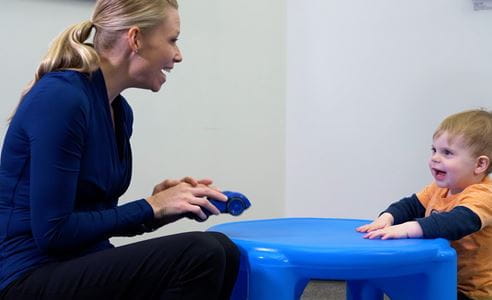In the United States, about 1 in 54 children are diagnosed with autism spectrum disorder (ASD) each year. For most families, this is a life-changing diagnosis. While each family’s journey brings many different emotions, ultimately the diagnosis helps many families understand their child in new ways and provides a roadmap for how to best support their child and access treatments. Making this diagnosis in early childhood, rather than later in life, maximizes each child’s potential to achieve meaningful developmental progress.
Faculty at Indiana University School of Medicine are making that happen with the implementation of Early Autism Evaluation (EAE) Hubs across the state. Beginning in 2012, an interdisciplinary team within the Department of Pediatrics, along with state and community autism organizations, have trained over two dozen primary care clinicians and their teams in 10 different health systems, to conduct autism evaluations for children 18-48 months of age. Children are identified as at-risk for autism during primary care well-child visits and then Ereferred to one of these EAE hubs geographically spread across the state.
“I am so proud to be a part of the autism early evaluation network and to offer this service to kids and families of southeastern Indiana,” said Kristina Wang, MD, a physician with Mary Margaret Health in Batesville, Indiana. “Families are so grateful that they have the ability to seek diagnostic evaluation at Margaret Mary because it both cuts down on wait time and brings services closer to home for them. Regardless of the outcome of the evaluation, families invariably feel such a sense of relief that they can start planning a way forward and I feel that I have truly served the family.”
A recent study released in Pediatrics shows just how much of an impact the EAE hubs have had in Indiana. Nationally, the average age of diagnosis for ASD is after age 4. Across the 12 EAE Hubs, the average age of diagnosis for Hoosier children is 30 months. Impressively, Hoosier children evaluated in the Hubs now experience a significantly reduced wait-time to have these critical evaluations, averaging two months, rather than the prior wait of nine to 12 months.
“One of the unique aspects of this effort is its scale. While similar innovative diagnostic approaches have previously been tested around the country, our primary-care Early Autism Evaluation hubs provide data representing much of the state of Indiana,” said Rebecca McNally Keehn, PhD, HSPP, assistant professor of pediatrics at IU School of Medicine and lead author on the Pediatrics study. “By improving access to earlier high-quality diagnostic evaluations in children’s local communities, our hope is that children will be enrolled earlier in evidence-based interventions that can improve developmental outcomes here in Indiana.”
The EAE hub system has also provided training to hundreds of Hoosier primary care clinicians, increasing their use of developmental and ASD-specific screening within routine well-child care. This community engagement work has further stimulated the referral path for a child identified as at risk from primary care to the local EAE hub.
"The convenience of having the testing site so close made a huge difference. With our large family, it was so much easier to not have to travel. The clinician was also very thorough which made us very at ease with the testing," noted a family from the Linton Early Autism Evaluation Hub at Green County Health, Inc.
The development and evaluation of the EAE Hub system has been made possible by the generous support of Riley Children’s Foundation and Kiwanis Indiana Three Wishes Campaign. Additional funding was provided by Project LAUNCH, Indiana State Department of Health, and ECCS CoIIN. Without local pediatric champions at each EAE Hub who are committed to providing Indiana’s children with this critical community-based service, the implementation of this system would not have been possible.
